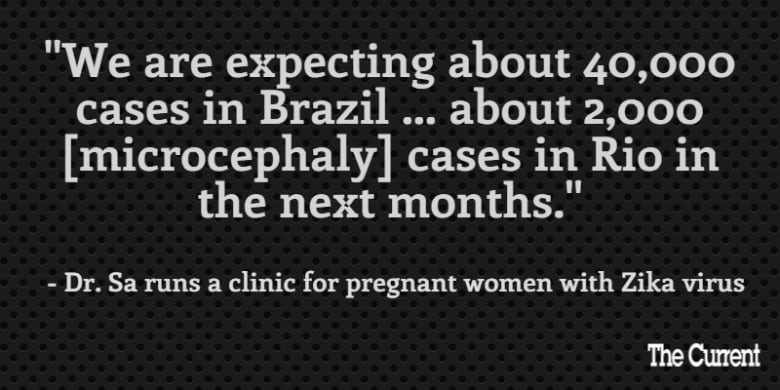Zika's Ground Zero: Brazil hits 4,000 suspected Zika-related cases of birth defects

Watch an American Sign Language interpretation of the documentary Stray Bullets, featuring Kathy Munro:
Zika virus has been confirmed as a cause of birth defects, including microcephaly, according to the U.S. Centers for Disease Control and Prevention. One CDC official describes the virus as "scarier than we thought."

While the Zika virus continues to spread throughout the Americas, Zika's epicentre remains in Brazil.
CBC's Dr. Brian Goldman, host of White Coat, Black Art, has recently returned from Campina Grande in the northeastern part of Brazil. He's been meeting the families and officials as they struggle with more than 4,000 babies with suspected Zika-related cases of birth defects, a number that's only growing.

Dr. Renato Sa, an obstetrician and fetal medicine specialist, says identifying every baby affected by Zika is a challenge since several ultrasounds to identify each case of microcephaly are both costly and time-consuming. And that's just the diagnosis. Dr. Sa feels the system is not prepared for the on-going medical needs microcephaly presents.
Microcephaly, which means an abnormally small head size, is the most overt evidence that a baby has been affected by the Zika virus — but inside is a destruction of the developing brain. The virus has a capacity to destroy the development of the nervous tissue, or prevent its development, causing failure in parts of the cerebrum, the cerebral hemispheres, the brainstem, and the cerebellum.

Dr. Alba Batista, a neurosurgeon in Campina Grande, tells mothers with babies who have microcephaly that their baby will have difficulty walking or not walk at all, have a hard time writing, learning to read and may need to take medications to prevent seizures for the rest of the child's life.
'Look at my prince'
Alessandra de Souza Amorim is a 34-year-old mother with four daughters and now, a nearly four-month-old son with microcephaly caused by the Zika virus.
Alessandra lives with her husband Alexandre Santiago and their children in Pedregal, one of the poorest neighbourhoods in Campina Grande. There is no basic sanitation and no screen doors to keep the mosquito infestation outside.
Baby Samuel has two physiotherapy appointments a week. While there are improvements in head control, Samuel is not able to recognize familiar objects, not even his mother. Doctors say he can't hear.
It was always a dream for Alessandra and her husband to have a son. She turns to her faith in God to give her the strength to get through the difficult years ahead and says,"God is seeing that I am a special mother to take care of my son."
Guests in this segment:
- Dr. Brian Goldman, veteran ER physician and host of CBC's White Coat, Black Art. His documentary on Brazil's Zika virus outbreak is called Stray Bullets.
- Tom Hobman, professor of cell biology at the University of Alberta and Canada Research Chair in RNA viruses and host interactions.
Stray Bullets was produced by Dr. Brian Goldman, and The Current's documentary editor is Joan Webber. The video is interpreted by American Sign Language - English Interpreter, Kathy Munro. Video produced by Andrew Budziak, Julia Pagel and Tanya Springer.

